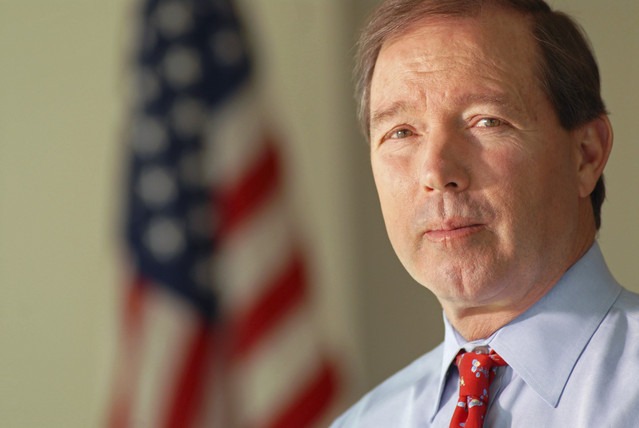Congress hasn’t passed a major environmental bill since 1996, when Bill Clinton signed amendments to the Clean Water Act. Now it seems that the “Frank R. Lautenberg Chemical Safety for the 21st Century Act,” is moving through the Senate and might actually make it to Barack Obama’s desk. The bill is a fix for the non-functional 1976 Toxic Substances Control Act (TSCA).
Named after a former Democratic Senator from New Jersey, who was working to reform the Toxic Substances Control Act when he died in 2103, and co-sponsored by New Mexico Democratic Senator Tom Udall, whose family name is an environmentalist brand (his uncle Stewart Udall was a conservationist interior secretary in the Kennedy and Johnson administrations), the Senate bill that establishes a process to evaluate and test more than 80,000 potentially hazardous chemicals should easily win the backing of environmental groups.
It has not.
Tom Udall, whose family name is an environmentalist brand, has provided this legislation some measure of green credibility, essentially putting lipstick on a pig to hide the ugly. Here’s the ugly.
As it turns out, the Vitter-Udall bill, co-sponsored by Republican Louisiana Senator David Vitter, is a Trojan Horse, cobbled together by the American Chemistry Council, a huge industry trade association, and pushed through the Senate by more than 100 lobbyists representing the chemical companies whose products would be regulated.
At an April 28 Committee markup of the bill, California Democratic Senator Barbara Boxer complained that one draft of the Vitter-Udall bill has been traced directly to an American Chemistry Council computer.
Boxer also placed in the record letters and statements from a coalition of 450 environmental, labor and public health groups that oppose the Vitter-Udall bill.
Members of the coalition ranged from the Sierra Club and Natural Resources Defense Council to the AFL-CIO and the Breast Cancer Fund.
A single green group, the Environmental Defense Fund, is supporting the bill. Its senior scientist struggled to vindicate himself at a March 15 hearing of the Senate Committee on the Environment and Public Works.
In a letter to the committee, California Attorney General Kamala Harris wrote that “the preemption of state authority with respect to high-priority chemicals years before federal regulations take effect” is a fundamental flaw in the bill.
Testifying at the hearing, Maryland Attorney General Brian Frosh explained “preemption of state authority.”
The preemption provisions that are built into this legislation tie the hands of states at nearly every turn. Among these, there is a prohibition on new state chemical restrictions from the moment EPA begins the process of considering regulation of high priority chemicals. It’s a plain fact that the bill itself allows this EPA review period to last as long as seven years.
Let’s say we’re talking about a toxic chemical. That’s seven years with no federal regulation, seven years during which no state can take action regardless of how dangerous, how toxic, how poisonous a chemical is, regardless of its impact on men, women or children.
The EPA testing will be, let’s say, protracted.
Of 80,000 synthetic chemicals commonly used in the U.S., 1,000 are considered potential health threats. Within the first seven years after implementation of the Vitter-Udall bill, only 25 of those chemicals would be tested by the EPA. Yet there is no provision in the bill that would stop the EPA from listing chemicals that it “is considering” testing, which would protect them from regulation by states.
Tom Udall and the Environmental Defense Fund have provided this legislation some measure of green credibility, essentially putting lipstick on a pig to hide the ugly.
Here’s the ugly.
The American Chemistry Council, Dow, Dupont, BASF, 3M, Honeywell and Koch Industries spent $62.9 million in 2014 lobbying members of Congress, according to the Center for Responsive Politics and lobbying disclosure forms filed in Congress. While the disclosure forms don’t link the lobbyists to specific bills, a study by the Environmental Working Group found that most of the forms referred to TSCA.
David Vitter, now running for governor in Louisiana, has been underwritten by the chemical industry for as long as he’s held elected office.
Senator Tom Udall, in Congress since 1999, has been largely ignored by the industry—until the 2014 election, when he turned up in the top 20 recipients of American Chemistry Council money, according to opensecrets.org. The Chemistry Council also ran television ads supporting Udall’s successful (54.4-44.6) race against Republican challenger Allen Weh.
It appears they’re getting a decent return on their investment.
Lou Dubose is the editor of The Washington Spectator.






0 Comments